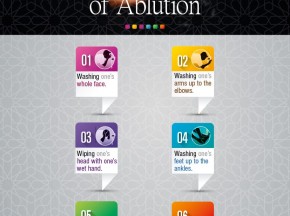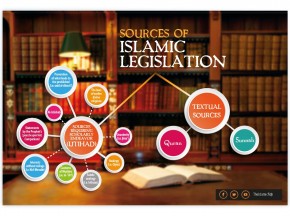content of level
Ablution
Wudu means cleanliness and brightness. But in Islam, it refers to washing the face, arms, head, and feet with clean water. In other words it is called ablution. It is obligatory before prayer or similar worship acts.
What does not invalidate Ablution
What does not invalidate Ablution: 1. Touching a person of the other sex skin to skin. 2. Bleeding from any part of the body other than that which comes from the private parts. 3. Vomit, regardless of its amount. 4. Doubting whether one’s ablution has been invalidated. 5. Loud laughter during the prayer (this invalidates the prayer but not the wudhu). 6. Washing a dead person to prepare him for burial.
The Obligatory Acts of Ablution
The Obligatory Acts of Ablution: 1.Washing one’s whole face. 2.Washing one’s arms up to the elbows. 3.Wiping one’s head with one’s wet hand. 4.Washing one’s feet up to the ankles. 5.Following the proper order. 6.Continuous progress: one part immediately after the one before it, without delay.
Recommended practices of sound nature (i.e. fitrah)
Recommended practices of sound nature (i.e. fitrah): 1.Shaving pubic hair. 2.Circumcision. 3.Trimming the moustache. 4.Nail clipping. 5.Plucking the armpit. 6- Brushing one’s teeth. 7- Rinsing one’s nose and mouth. 8- Washing the back of finger joints. 9- Washing private parts.
Sources of Islamic legislation
Sources of Islamic legislation 1-Textual sources: - Quran -Sunnah 2- Sources requiring scholarly endeavor (ijtihad). 1- Unanimity (i.e. Ijma' ). 2- Analogy (i.e. Qiyas). 3- Subtle analogy (i.e. Isthsan). 4- Interests without rulings (i.e. Ma li Mursalah). 5- Customs of Muslims (i.e. al- 'Urf). 6- Statements by the Prophet’s (peace be upon him) Companions’. 7- The laws of earlier divine religions. 8- Prevention of what leads to the prohibited (i.e. sadd al-dhara’i'). 9- Al-Istishab.
What is recommended in the prayer
What is recommended in the prayer • Saying (opening du’aa’) after the opening takbeer. • Seeking refuge with Allah. • Saying Bismillaah. • Saying Ameen. • Reciting a surah after al-Faatihah. • Reciting out loud, in the case of the imam or individual in the first two rak'ah of Fajr, Maghreb and Isha. •Saying after the tahmeed (Rabbana wa laka’l-hamd): “Mil’ al-samawaati wa mil’ al-ard wa mil’ ma shi’ta min shay’in ba’d (Filling the heavens, filling the earth, and filling whatever else You wish).” •Saying the tasbeeh (when bowing or in prostration) more than once, such as a second or third time or more. • Saying “Rabb ighfir li (Lord forgive me)” more than once between the two prostrations. •Saying the recommended du’aa’ after offering the salutation upon the Prophet (peace be upon him) and his family known as Assalatul Ibrahimiyah.
Fiqh of Family- Divorce - Part XI
In this lecture Sh. Ahmed AlRumh talks on the topic of Rulings on Divorce in Islam -11.
Fiqh of Family - Divorce - Part X
In this lecture Sh. Ahmed AlRumh talks on the topic of Rulings on Divorce in Islam -10.
Fiqh of Family - Divorce- Part IX
In this lecture Sh. Ahmed AlRumh talks on the topic of Rulings on Divorce in Islam -09.
Fiqh of Family - Divorce - Part VIII
In this lecture Sh. Ahmed AlRumh talks on the topic of Rulings on Divorce in Islam -08.
Fiqh of Family- Divorce - Part VII
In this lecture Sh. Ahmed AlRumh talks on the topic of Rulings on Divorce in Islam -07.
Fiqh of Family - Divorce - Part VI
In this lecture Sh. Ahmed AlRumh talks on the topic of Rulings on Divorce in Islam -06.
Fiqh of Family- Divorce - Part V
In this lecture Sh. Ahmed AlRumh talks on the topic of Rulings on Divorce in Islam -05.
Fiqh of Family- Divorce- Part IV
In this lecture Sh. Ahmed AlRumh talks on the topic of Rulings on Divorce in Islam -04.
Fiqh of Family - Divorce - Part III
In this lecture Sh. Ahmed AlRumh talks on the topic of Rulings on Divorce in Islam -03.
Fiqh of Family- Divorce - Part II
In this lecture Sh. Ahmed AlRumh talks on the topic of Rulings on Divorce in Islam -02.
Fiqh of Family - Divorce - Part I
In this lecture Sh. Ahmed AlRumh talks on the topic of Rulings on Divorce in Islam -01.
Fiqh of Family - Dealing with Disobedient wife
In this episode, Sh. Ahmed AlRumh explains how to deal with a disobedient wife in Islam.
Fiqh of Family- New Born - Part II
In this episode, Sh. Ahmed AlRumh explains The etiquettes of the new born baby and some advices to the parents – 02.
Fiqh of Family - New Born- part I
In this episode, Sh. Ahmed AlRumh explains The etiquettes of the new born baby and some advices to the parents – 01.




















